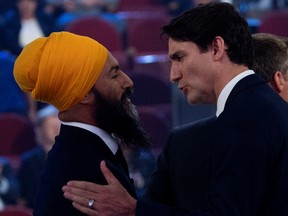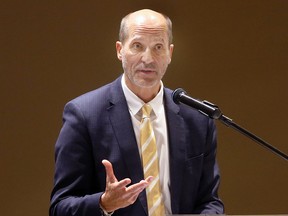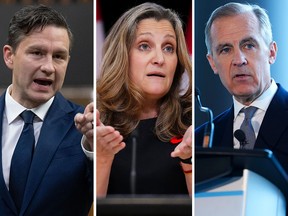‘We need to ask ourselves whether more spending, more debt and bigger government are really what’s needed’
Article content
Prime Minister Justin Trudeau announced that his Liberal party and the New Democrats have agreed to form a quasi-coalition that would support the current government through to the end of its mandate in 2025.
Advertisement 2
Article content
“What this means is that during this uncertain time, the government can function with predictability and stability,” Trudeau said at a press conference on March 22. “We’re different political parties. We stand for different things. But where we have common goals, we cannot let our differences stand in the way of delivering what Canadians deserve.”
Trudeau cited the war in Ukraine and the prospect of slower economic growth in the year ahead as challenges for the current minority government, which relies on garnering support from other parties to pass legislation. The agreement is not quite a coalition since no NDP MPs will take up cabinet seats, but the New Democrats have agreed to support and help the Liberal caucus pass laws on policies for such things as dental-care and pharma-care.
Advertisement 3
Article content
Below is a round-up of reaction from the business community, edited for brevity and flow:
Rebekah Young, director of fiscal and provincial politics, Bank of Nova Scotia:
“In the near-term, there’s modest but clear, incremental spending that will be planned, but the most important feature of what they’ve said is that they’re laying the groundwork for a larger, structural deficit beyond three years. If you look at the wording, in particular, of the pharma-care developments it doesn’t look like they plan big spending this year or next year. They look at an act in ’23 and a formulary in ’25 and that takes us to the end of this pact. But we know that’s laying the groundwork for what’s been costed as an $11-billion-a-year program. You add on universal dental care, you’re easily adding about half a percentage of GDP on to your structural deficit. So, bottom line: more spending. I would say there is one offset in that we’re also expecting revenue windfalls, but I suspect extra spending will overpower the additional windfalls that could be booked just yet.”
Advertisement 4
Article content
Perrin Beatty, president and chief executive, Canadian Chamber of Commerce:
“We need to send a message to investors that they’re welcome in Canada, which means that in the rhetoric that’s used by politicians and by their strategy on taxation, our goal shouldn’t be to create conditions that are unfriendly. We just don’t know on the basis of the announcement made today what sort of plan we’re going to be seeing and that creates greater uncertainty. And unfortunately, uncertainty is the enemy of investment. People want to know what the rules are and what the conditions are and if they’re still going to be operating.”
There’s really nothing that focuses any attention on the economy
Dan Kelly, Canadian Federation of Independent Business
Dan Kelly, president and chief executive, Canadian Federation of Independent Business:
“The implications are significant for small businesses. The last thing we need is the prospect of another election at this very moment. As the economy remains really turbulent, having political stability is not unwelcome. The other thing that gives me a little bit of solace is that the NDP has been more outwardly supportive of small business in recent years than was the case, perhaps a decade or so ago. But there’s some pretty big worries from when I look at the list of areas on which there seems to be a meeting of the minds and any concern for the economy seems to be issue No. 5,000 on this list. There’s really nothing that focuses any attention on the economy.”
Advertisement 5
Article content
-

NDP deal in effect gives Trudeau a majority government to ‘get things done for Canadians’
-

Liberal’s deal with NDP puts bank tax back on the table
-

Liberal-NDP deal includes a push for 10 days of paid sick leave for federal workers
Robert Asselin, senior vice-president of policy, Business Council of Canada:
“We won’t know for sure until we see the budget, but the agreement announced this morning will potentially add billions of dollars to an already unhealthy structural deficit. At a time when inflation is squeezing Canadians’ pocketbooks and the economic outlook is fraught with uncertainty, we need to ask ourselves whether more spending, more debt and bigger government are really what’s needed. As our country emerges from the pandemic, we should be doubling down on policies to strengthen economic growth. The right path is to grow the economy to pay for new spending measures – not the other way around.”
• Email: bbharti@postmedia.com | Twitter: biancabharti
Advertisement
‘Bottom line, more spending:’ What business leaders think of the Liberal, NDP alliance
2022-03-22 19:08:27






